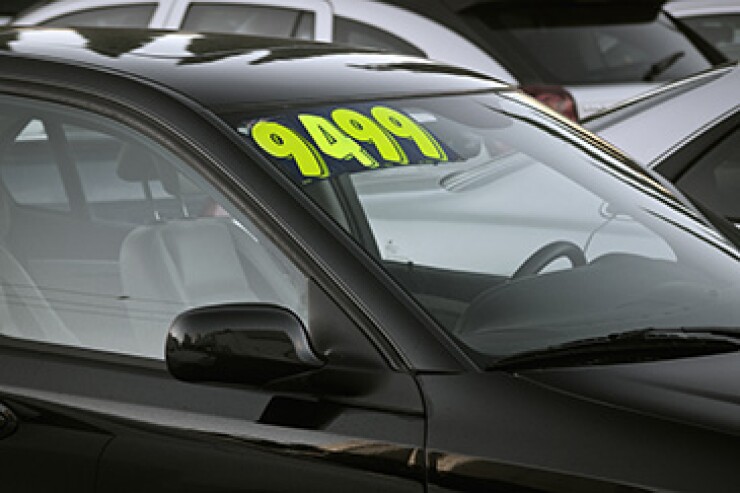
U.S. banks are taking bigger risks in auto lending as they compete for market share in a sector that remains red-hot. And analysts at Moody's Investors Service are predicting that the road ahead looks bumpy, with banks poised to recover less of their money when cars get repossessed than some of their competitors will.
Between 2010 and 2014, banks reported relatively low delinquency rates on car loans to so-called prime borrowers, according to a new report from the credit rating agency. But over time those rates have risen, and are now comparable with the late-payment rates at the financing arms of auto manufacturers.
The report looks at prime auto loans that are packaged into bonds and are at least 60 days late. It finds that the delinquency rate on bank-sponsored bonds have roughly doubled over the last three years, though the authors note that the delinquencies are far lower than they were during the Great Recession.
One probable reason: car buyers who borrow from banks have lower credit scores than they did a few years ago. The average borrower credit score in bonds backed by bank-issued auto loans fell from around 760 in 2013 to below 735 last year, Moody's found.
Following the financial crisis, banks had ample access to low-cost funding, and one way they took advantage was by
But the auto-lending market has become much more competitive during the last few years, with the car makers frequently offering rock-bottom rates — sometimes as low as 0% — as a tactic to sell more vehicles.
In that environment, banks have been looking for ways to hold onto their share of the business. For example, banks have been approving borrowers with lower average credit scores. They have also been offering longer-loan terms, which can lower monthly payments for borrowers but can also increase the risk to lenders.
Banks that package their auto loans into bonds include Bank of America, Bank of the West, California Republic Bank, Fifth Third Bancorp, Huntington Bancshares, M&T Bank, SunTrust Banks, TCF Bank and USAA.
Among the auto manufacturers, top competitors include Ford Motor Credit Co., Toyota Financial Services and Honda Financial Services.
Banks are more exposed to the used-car market than the finance arms of automakers are. During the third quarter of last year, banks had 35.6% market share in used-car lending, compared to just 7.5% for the auto manufacturers, according to Experian.
Analysts expect used-car values to fall significantly in 2016 and 2017, as a large number of vehicles that were leased in recent years come onto the market and create a glut of inventory.
"We expect to see a reduction in prices of 5% per year over the next couple years," Tim Russi, the president of auto finance at Ally Financial, said during a recent presentation.
The Moody's report offers a glum near-term outlook for auto lending at banks, noting that their recoveries on defaulted auto loans are historically relatively small. That is partly because used cars are often worth very little by the time they get repossessed.
"A softening in used vehicle values will likely contribute to declining recoveries for defaulted loans," the report states. Moody's predicts that both banks and auto makers will be hit, but finds more reasons to worry about the losses that banks will sustain.
Banks are taking steps to prepare for the widely anticipated decline in used-car values, said Christopher Donat, an analyst at Sandler O'Neill & Partners. For example, Ally started leasing used vehicles earlier this year. That program could offer at least a partial answer to the new-car leases that will be ending in the coming months.
"They're aware it's coming," Donat said of the used-car glut. "Whether or not [the response will] be sufficient is a good question. But they're not blind to it."





